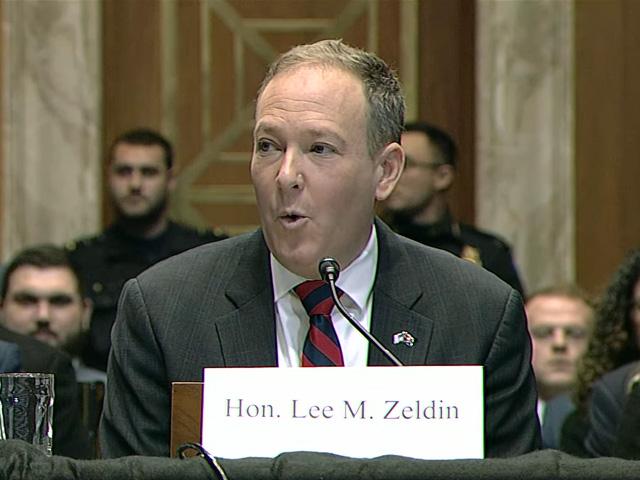Zeldin: Oil Industry Has No Influence

LINCOLN, Neb. (DTN) -- Lee Zeldin received hundreds of thousands of dollars from oil interests as a member of Congress for eight years -- an important point for U.S. farmers who have for decades committed capital to building and supporting corn-ethanol production and other biofuels.
Zeldin, President-elect Donald Trump's nominee to head the U.S. Environmental Protection Agency, was questioned about whether that influence would drive how he does his job and makes decisions, during a three-hour confirmation hearing before the U.S. Senate Environment and Public Works Committee on Thursday.
During the first Trump administration, previous EPA Administrator Scott Pruitt's connections to the oil industry later became a big factor in the agency granting numerous small-refinery exemptions to the Renewable Fuel Standard.
"While you've made a lot of good and sound statements here today, it's one thing to say things in this environment and it's another thing to stand by those guns when the pressure comes at you," Sen. Sheldon Whitehouse, D-R.I., said during the hearing.
"In the wake of being so surrounded with so much corporate and fossil fuel influence, I want to give you two opportunities to answer to me now. How is it that you'll be able to separate yourself from the influence of these people and these interests, when they come demanding things that they think they've earned politically?"
Zeldin, who as a representative of New York previously, is on record as opposing ethanol and the Renewable Fuel Standard, received nearly $300,000 in contributions from the oil and gas industry dating back to 2007.
Sen. Pete Ricketts, R-Neb., told reporters weeks ago that he came away from a meeting with Zeldin confident he would support the RFS as EPA administrator.
"There is no person who has ever provided any level of support to me or anyone else who has any special influence with me," Zeldin said on Thursday.
"It is important for me to have always been able to approach this position with a clear conscience to make decisions that I can live with for my entire life. There is no dollar, large or small, that can influence the decisions that I make."
Members of the committee, including Ricketts, did not again ask Zeldin about his anti-ethanol past. Committee members instead brought up environmental concerns specific to their districts and asked Zeldin for his commitment to those issues.
RICKETTS, RFS
Ricketts said during the hearing that when it comes to the volume levels in the Renewable Fuel Standard the Biden administration has often set those volumes "below production levels" and created economic uncertainty in rural America.
"The RVOs (renewable volume obligations) for 2026 are required by law to be published on Nov. 1, 2024," Ricketts said.
"That didn't happen. And it's not likely to happen until probably December 2025. The 2023 and 2024 RVOs will lag behind industry production by 3 to 4 billion gallons. That's the actual capacity in the industry today. Congressman Zeldin, do you commit to give producers and the industry certainty in the marketplace? And again, this is what business wants -- certainty. They want to know what the rules are so they can plan for it."
Zeldin responded, "Yes, senator."
Leading up to the holiday break in Congress, making E15 available year-round nationally was a part of a funding bill but was later removed from final legislation.
Ricketts asked Zeldin if agriculture could rely on the EPA to do its part "to create a market of certainty" for liquid fuel stakeholders and agriculture producers.
"Senator, while I can't prejudge outcome of processes to follow across the board, I know how important this issue is to you and I know how important this is to President Trump," Zeldin said.
"The president has expressed this time and again. So, I understand how much of a priority this is for you as far as establishing certainty. Hopefully this is something that Congress is able to resolve to the extent that you're relying on the EPA to establish that certainty."
WOTUS PING PONG
Farmers and ranchers have seen many changes in the waters of the United States rule that span several presidential administrations.
During the Biden administration, the Supreme Court made a decision in Sackett v. EPA that changed the way federal government could regulate wetlands.
Though the Biden EPA put out a rule making changes to the law to comply with the Sackett decision, there continues to be confusion about what constitutes jurisdictional waters.
Zeldin was asked by Ricketts whether the next Trump EPA would provide clear guidance.
"Senator, I believe that it's incredibly important for the EPA to provide clean, clear and durable guidance as it relates to waters of the U.S. and the Sackett decision is easy to understand for any of those property owners in your state," Zeldin said.
"Still, they have questions as it relates to the rules and regulations that are on the books. It should be as clear as possible so that your people can understand without having to go hire an attorney or someone else to assist them with compliance and definitions."
ELECTRIC VEHICLE MANDATE
Ricketts said so-called EV mandates aren't practical for states like Nebraska to follow. Out of the 147 communities in Nebraska classified as cities, Ricketts said 99 of them don't have a single EV charger.
"If you're living in communities like Bloomfield, Alliance, Valentine, you're 45 minutes from the nearest charging station and in my state EV adoption is like 2% when nationally it's about 7%," he said.
"Do you commit to rolling back these out of touch mandates that are costly to Americans and dangerous to our energy grid?"
Zeldin said he's not allowed to "prejudge outcomes" going into rulemakings to "ensure that there's durability of any decision" to be made.
"I will tell you that I have heard concerns from you and many others in this chamber of how important it is," Zeldin said.
American Coalition for Ethanol CEO Brian Jennings said in a statement he was pleased to see Zeldin being quizzed on biofuels issues.
"If confirmed as EPA administrator, Mr. Zeldin will be tasked with overseeing the Renewable Fuel Standard and E15 -- two critical issues for the biofuels industry that he has previously opposed," Jennings said in a statement.
"We appreciate his commitments to follow the law as it relates to timely and appropriate RVO rulemakings and doing his part to ensure year-round E15 nationwide, building on the momentum of E15 legislation initially included in the year-end funding package."
FOSTER INNOVATION
Ricketts said he wants the EPA and other federal agencies to foster innovation, including in biofuels and other industries, while not picking technology winners and losers.
In particular, Ricketts expressed concern with the Biden administration's push for electric vehicles at the detriment of renewable fuels.
Ricketts said biofuels producers have come up with innovative ideas to cut reliance on fossil fuels while reducing emissions, including installing E85 technology onto hybrid vehicles.
"They wanted to push their solution with electric vehicles and again, electric vehicles can be part of the solution on how we do that as well," Ricketts said.
"What we should be focusing on is how American innovation ... is how we solve our problems in this country. So that's the kind of innovation that can help us reduce our impact on the environment if we're allowed, if we're allowed as Americans to actually innovate and rather than have this big top-down government, one-size-fits-all like we're going to push this solution."
Read more on DTN:
"Sizing Up Biofuels Future in Trump EPA," https://www.dtnpf.com/…
Todd Neeley can be reached at todd.neeley@dtn.com
Follow him on social platform X @DTNeeley
(c) Copyright 2025 DTN, LLC. All rights reserved.







